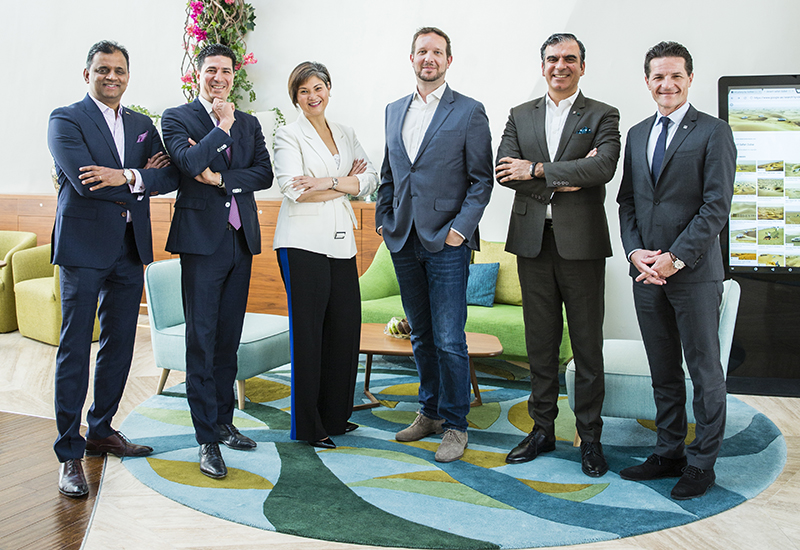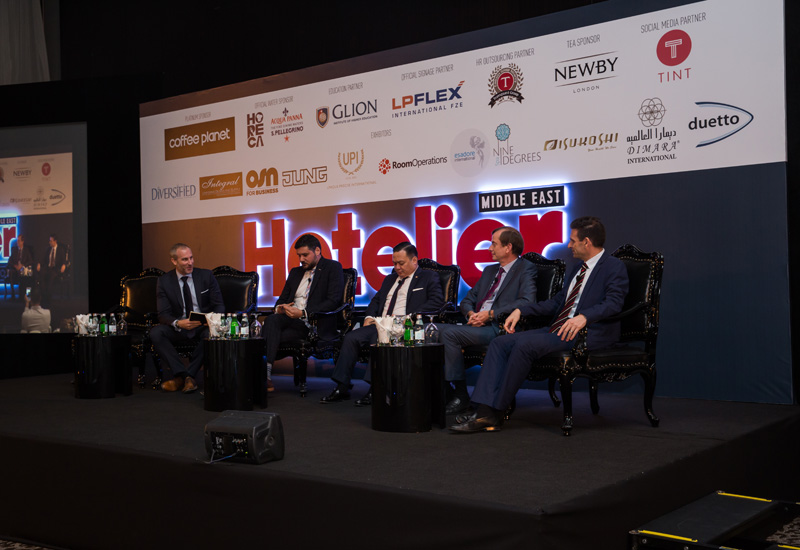 (From L-R) Siddhartha Sattanathan, General Manager, Radisson Blu Hotel Ajman; Omar Souab, General Manager, Fairmont Fujairah Beach Resort; Patria Puyat, General Manager, Holiday Inn Dubai Festival City; Andreas Plum, General Manager, Aloft Al Ain; Samir Arora, General Manager, The Retreat Palm Dubai MGallery by Sofitel and Olivier R. Harnisch, Chief Executive Officer, Emaar Hospitality Group.
(From L-R) Siddhartha Sattanathan, General Manager, Radisson Blu Hotel Ajman; Omar Souab, General Manager, Fairmont Fujairah Beach Resort; Patria Puyat, General Manager, Holiday Inn Dubai Festival City; Andreas Plum, General Manager, Aloft Al Ain; Samir Arora, General Manager, The Retreat Palm Dubai MGallery by Sofitel and Olivier R. Harnisch, Chief Executive Officer, Emaar Hospitality Group.
Meet the experts:
• Samir Arora, General Manager, The Retreat Palm Dubai MGallery by Sofitel
• Olivier R. Harnisch, Chief Executive Officer, Emaar Hospitality Group
• Patria Puyat, General Manager, Holiday Inn Dubai Festival City
• Siddhartha Sattanathan, General Manager, Radisson Blu Hotel Ajman
• Andreas Plum, General Manager, Aloft Al Ain
• Omar Souab, General Manager, Fairmont Fujairah Beach Resort
HOTELIER: Right, so what are some of the key issues you want to kick off the discussion with?
OLIVIER: Something I often speak about is efficiency: how to make our business models more flexible and more efficient going forward, because even though this is one of the most dynamic markets in the world and the healthiest, we will have more volatility in the future. We as an industry in Dubai are excellent in delivering quality. But we will have to learn to deliver quality with flexibility going forward. How will we continue to deliver outstanding quality while adapting our hotels to be more flexible?
SAMIR: The equilibrium of supply and demand of what is coming online and what’s beyond 2020; I know there a lot of initiatives being done already by DTCM. Going forward, how does the government plan to unify all seven tourism boards and promote the country as a tourism destination? That’s something which at some point the country will have to look at.
OLIVIER: It was a discussion at AHIC. There is still a perception that UAE equals Dubai, and we know that the UAE is much more diverse than that and by having a unified tourism strategy everyone will benefit from it.
SAMIR: If you look at the RevPAR there is a huge gap between cities.
SIDDHARTHA: We are looking at RevPAR, but that’s not what the tourism boards might be after because they are looking about making UAE and Dubai more affordable. Their target is visitor numbers.
OMAR: The approach is changing when it comes to tourism boards such as Dubai and Ras Al Khaimah. As you were saying earlier, most of the international clients would say ‘Dubai and Abu Dhabi’, but the infrastructure of Dubai helps the northern emirate.
OLIVIER: The other thing is the mix of tourists. The growth numbers are impressive. In Dubai it’s 7% per year which is amazing. The Dubai market gains over two million room nights every year in additional demand. Other Emirates like RAK have passed the mark of one million tourists. I assume that the other Emirates have similar growth rates. This growth also comes from non-traditional markets. Look at Dubai, where did the growth come from? Russia and China, India... These markets grow much faster than traditional markets. The question to us as hoteliers is not only how are we sustainable, but how do we prepare ourselves? The needs of Chinese travellers are very different from the needs of European travellers.
SAMIR: Does the kind of supply that’s coming online match the rate on offer from these markets? Growth is coming from these markets but they don’t appeal to all kinds of hotels. Dubai is primarily a luxury destination.
OLIVIER: For the foreseeable future Dubai will remain a luxury upscale destination. When you look at supply of rooms today, it’s four-star and five-star plus. But if you look at the pipeline, there’s a rebalancing. In the pipeline there’s a higher percentage of mid-market hotels. That is interesting because it changes the nature of the market in Dubai. There’s also a learning effect here because there’s a misperception about the mid-market traveller. They don’t all have less money to spend than our guests in our five star hotels. Some of them do, but not all of them.
SAMIR: They tend to spend money outside the hotel, so what kind of facilities must one have in the hotel to make sure they spend money inside?
OMAR: The business model has to shift. Do we want lots of F&B or less?

| Advertisement |









 Search our database of more than 2,700 industry companies
Search our database of more than 2,700 industry companies









